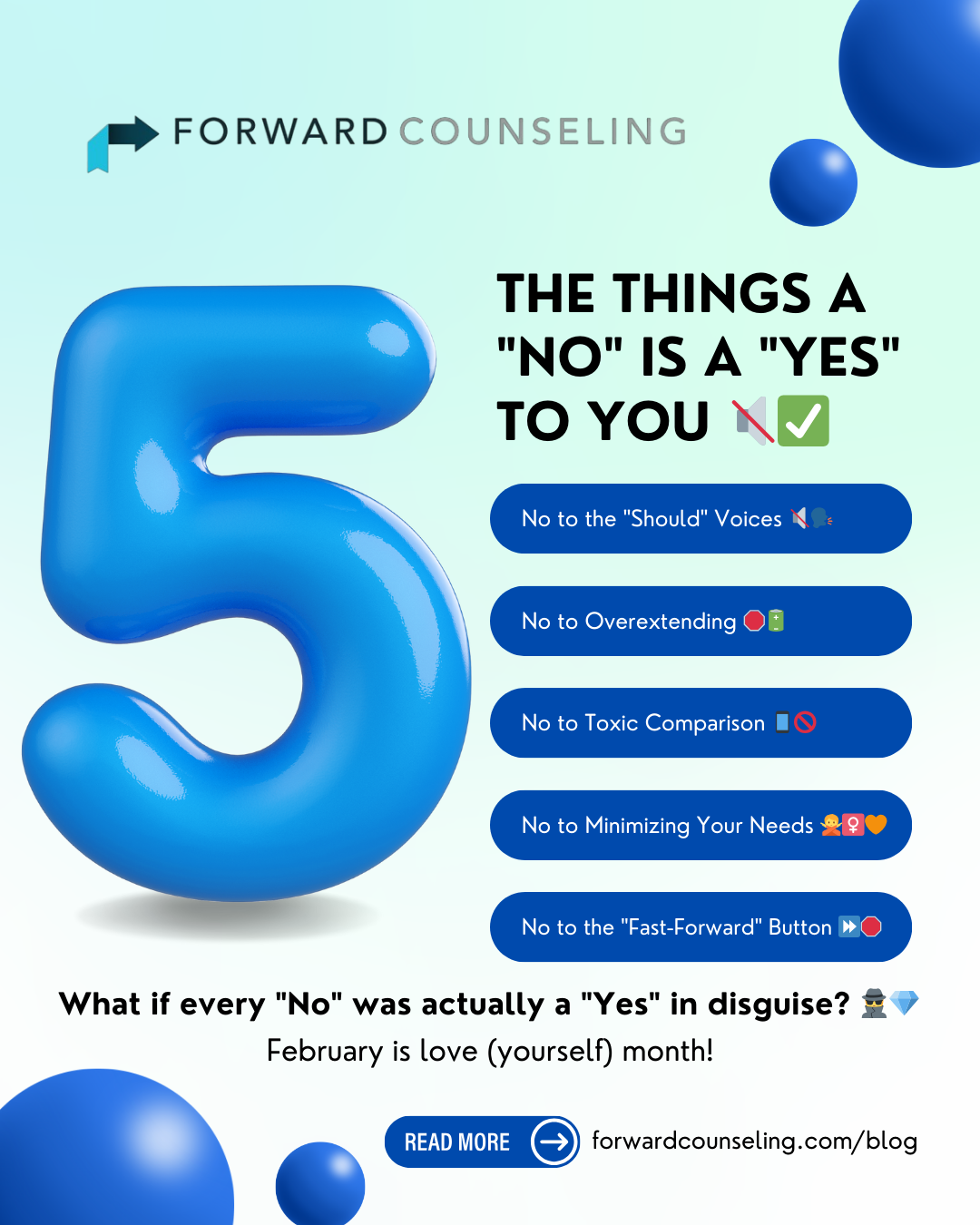Beyond "Be a Man": A Conversation on Men's Mental Well-being with Ryan Pepperman, NCC
/Addressing men's mental health requires a nuanced understanding, as challenges often manifest differently and are compounded by societal stigmas that discourage help-seeking. From recognizing less overt warning signs to exploring effective strategies beyond traditional therapy, this discussion delves into how men can prioritize their well-being, build stronger support systems, and overcome the unique pressures impacting their emotional expression and willingness to seek support.
Forward Counseling’s provider, Ryan Pepperman, NCC is a dedicated professional with over a decade in the helping field, is deeply committed to fostering mental, social, and emotional well-being. Now settled in East Nashville with his family, Ryan shares invaluable insights on men's mental health, drawing from his rich professional background and personal dedication to supporting others.
In this Q&A, join us as he tackles common challenges, addresses prevailing stigmas, and offers practical strategies for men to prioritize their mental well-being as we celebrate Men's Health Month.
What are some of the most common mental health challenges you observe in men, and how might these present differently than in women?
Understanding gender differences in how mental health issues present can lead to more effective support and intervention. The most common mental health challenges that I observe in men along with how they may present differently than in women: are depression, anxiety disorders, substance use disorders, anger and irritability, PTSD, and relationship difficulties. Men often express emotional distress in externalizing ways, compared to the internalizing patterns more often seen in women.
The stigma around men seeking mental health help often stems from outdated masculine norms that equate vulnerability with weakness, coupled with a lack of emotional literacy and limited social support. Ryan was able to break this down, and emphasized that we must normalize help-seeking as a strength, promote emotional psychoeducation, and encourage supportive group environments.
2. Why do you think there's often a stigma surrounding men seeking help for their mental health, and how can we begin to break it down?
Cultural norms, both past and present, around masculinity are one of the biggest barriers that we are working on breaking down. There is also a fear of stigma or being perceived as weak. Again, an antiquated relationship between men, their mental health, and their role and status in society. A lack of emotional literacy and generally having fewer social supports or reluctance to open up to even close friends all serve as obstacles to men and the emotional support and peace that would often increase their level of life enjoyment and success. Strategies to break down these long-standing barriers include: normalizing help-seeking as a strength, promoting psychoeducation around emotions and healthy coping, and using group therapy or men’s support groups where emotional safety can grow in community.
Mental health challenges in men often manifest differently than in women, making early detection crucial for effective support. Friends and family members play a vital role in recognizing these less overt signs.
3. What are some early warning signs that a man might be struggling with his mental health that friends or family members could look out for?
Irritability, anger, risk-taking behavior, substance abuse, and difficulty concentrating rather than sadness or crying. Many men are socialized to avoid vulnerability, leading to:
Trouble naming or expressing emotions.
Difficulty forming close relationships.
Emotional expression through action (e.g., overworking, aggression).
Prioritizing mental well-being doesn't always require formal therapy; many effective strategies can be integrated into daily life. Men can significantly enhance their mental health by adopting practical, everyday habits that foster emotional resilience and personal growth.
4. Beyond traditional therapy, what are some practical, everyday strategies men can use to prioritize and maintain their mental well-being?
Develop an emotional vocabulary
Move daily through a physical activity that is enjoyable
Limit mindless screen time
Cultivate connection through scheduling time for male friendships
Challenge unhelpful masculine norms
Engage in purposeful hobbies
Prioritize routine and rest
Normalize check-ins and self-education
Societal pressures and traditional expectations of masculinity profoundly shape how men express their emotions and their willingness to seek help. Ryan stated that these deeply ingrained norms often create significant barriers to open emotional expression and seeking support.
5. How do societal pressures or traditional expectations of masculinity impact men's emotional expression and their willingness to seek support?
Some of the most common societal pressures include:
Emotional suppression (real men don’t cry)
Self-reliance (handle it on your own)
Role playing (feeling the need to serve as the protector)
These pressures provide an outdated and rigid framework that often keeps men from recognizing warning signs, emotional burnout, and then recognizing the need, availability, and know-how to seek support.
The connection between a man's physical and mental well-being is often underestimated, yet it is profoundly significant. Integrating physical health practices into daily life can serve as a powerful tool for enhancing mental resilience and overall emotional stability.
6. What role does physical health play in a man's mental well-being, and how can they be integrated?
I came across a quote once that said something along the lines of “If more people incorporated frequent physical exercise, I would have far less clients.” All this to say that physical exercise is vital and directly related to our mental health. It is something I recommend to anyone I work with to concurrently engage in while working together.
Stepping into therapy can feel daunting for many men, often due to societal expectations or a fear of vulnerability. However, beyond common perceptions, therapy offers a range of unexpected benefits that can significantly enhance one's life.
7. For men hesitant to try therapy, what would you say are the benefits they might not expect?
For men who are hesitant about therapy—whether due to cultural norms, fear of vulnerability, or just not knowing what to expect—there are several benefits they often don’t anticipate, especially if they’ve never experienced a supportive, nonjudgmental space to explore what’s going on inside. These include:
Clarity (therapy helps you untangle the noise)
Tools and strategies that actually work
Improved performance (at work, in relationships, in life)
A relationship without pressure
Understanding yourself and gaining better control
Breaking generational patterns
Redefining strength
Societal norms often encourage men to be self-reliant, which can inadvertently lead to isolation and a lack of emotional support. However, building robust support systems and healthy emotional outlets is crucial for men's overall well-being.
8. How can men build stronger support systems and healthy emotional outlets in their lives?
Many men are taught to be self-reliant and avoid vulnerability, which can leave them isolated or emotionally under-supported. Building a support system includes reclaiming friendships through an emotional framework. Often men build their networks around activity but not emotional support. Other strategies include identifying safe people and joining or creating a men’s group.
A man who is struggling with his mental health but is resistant to help can be challenging, yet your approach can make a significant difference. It's important to navigate these conversations with empathy and understanding to encourage him to open up.
9. What advice do you have for partners or family members who want to support a man in their life who might be struggling but is resistant to help?
Lead with curiosity, not criticism or judgement. Normalize help-seeking while creating a safe space for expression. Offer choices, avoid closed questioning, and pay attention to behavior rather than just focusing on words.
Understanding common symptoms and challenges can reduce feelings of isolation and provide a framework for discussing his concerns (Corrigan, 2004). Ryan emphasized that self-education can empower them to take a more active role in their recovery journey.
10. If he is ready to seek help, what are the first steps he should consider?
Start by researching both what they are experiencing and the available options for them. Therapy is about building a strong, safe therapeutic relationship with another individual; so don’t be discouraged if you don’t hit it off with a therapist or two. Stay with it, and don’t give up on finding that safe space for self-exploration.
Specializing in men's mental health, Ryan offers compassionate support to help you navigate challenges, break down stigmas, and embrace true strength. Don't wait—take the crucial step towards a healthier, happier you
We are here to support you, whether you’re looking for in-person or virtual sessions.







